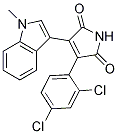
SB 216763 is a potent and selective ATP-competitive inhibitor of the serine/threonine protein kinase glycogen synthase kinase-3 (GSK-3) α and β isozymes. Glycogen synthase kinase 3 (GSK3) is a serine/threonine protein kinase that is inhibited by an assortment of extracellular stimuli including insulin, growth factors, cell specification factors, and cell adhesion. SB 216763 displays similar potency for GSK-3β with 96% inhibition at 10 μM while exhibiting minimal activity against 24 other protein kinases (IC50 >10 μM). SB 216763 stimulates glycogen synthesis in Chang human liver cells with an EC50 value of 3.6 µM and induces expression of a β-catenin-LEF/TCF regulated reporter gene in HEK293 cells. SB 216763 treatment at 25-50 μM reduces cell viability in a dose-dependent manner, and leads to significant increase in apoptosis by 50% at 72 hours due to the specific down regulation of GSK-3β. Administration of SB 216763 at 20 mg/kg significantly prevents lung inflammation and the subsequent fibrosis in bleomycin (BLM)-induced pulmonary inflammation and fibrosis model in mice by significantly blocking the production of inflammatory cytokines MCP-1 and TNF-α by macrophages.
| Cell Experiment | |
|---|---|
| Cell lines | BXPC-3 cells and MIA-PaCa2 cells |
| Preparation method | BXPC-3 cells were treated with DMSO or the indicated concentration of GSK-3β inhibitors (AR-A014418 and SB216763) over the indicated time course. Relative cell viability was measured using the colorimetric 3-(4,5-dimethylthiazol-2-yl)-5-(3-carboxymethoxyphenyl)-2-(4-sulfophenyl)-2H-tetrazolium assay. B, MIA-PaCa2 cells and the normal human mammary epithelial cell line HMEC, and embryonic lung fibroblast cell line WI38 were treated with DMSO or the indicated GSK-3β inhibitor (25 μmol/L). |
| Concentrations | 1, 10, 25, 50µM |
| Incubation time | 24, 48 or 72h |
| Animal Experiment | |
|---|---|
| Animal models | saline induced pulmonary fibrosis model of C57BL/6N mice (12 weeks old) |
| Formulation | 25% dimethyl sulfoxide, 25% polyethylene glycol, and 50% saline |
| Dosages | 20 mg/kg |
| Administration | intravenously twice a week until day 28 |
| Molecular Weight | 371.22 |
| Formula | C19H12Cl2N2O2 |
| CAS Number | 280744-09-4 |
| Solubility (25°C) | DMSO 20 mg/mL |
| Storage |
Powder -20°C 3 years ; 4°C 2 years In solvent -80°C 6 months ; -20°C 1 month |
| Species | Mouse | Rat | Rabbit | Guinea pig | Hamster | Dog |
| Weight (kg) | 0.02 | 0.15 | 1.8 | 0.4 | 0.08 | 10 |
| Body Surface Area (m2) | 0.007 | 0.025 | 0.15 | 0.05 | 0.02 | 0.5 |
| Km factor | 3 | 6 | 12 | 8 | 5 | 20 |
| Animal A (mg/kg) = Animal B (mg/kg) multiplied by | Animal B Km |
| Animal A Km |
For example, to modify the dose of Compound A used for a mouse (20 mg/kg) to a dose based on the BSA for a rat, multiply 20 mg/kg by the Km factor for a mouse and then divide by the Km factor for a rat. This calculation results in a rat equivalent dose for Compound A of 10 mg/kg.
| Related GSK-3 Products |
|---|
| Phospho-Glycogen Synthase Peptide-2(substrate)
Phospho-Glycogen Synthase Peptide-2 (substrate) is peptide substrate for glycogen synthase kinase-3 (GSK-3) and can be used for affinity purification of protein-serine kinases. |
| FRATtide
FRATtide is a peptide derived from the GSK-3 binding protein that inhibits the phosphorylation of Axin and β-catenin. |
| ZDWX-25
ZDWX-25 is a highly potent GSK-3β and DYRK1A dual inhibitor with an IC50 value of 71 nM for GSK-3β. |
| TC-G 24
TC-G 24 is a potent, selective glycogen synthase kinase-3β (GSK-3β) inhibitor with an IC50 of 17.1 nM. |
| SAR502250
SAR502250 is a potent, selective, ATP competitive, orally active and brain-penetrant inhibitor of GSK3, with an IC50 of 12 nM for human GSK-3β. |


Products are for research use only. Not for human use. We do not sell to patients.
© Copyright 2010-2023 AbMole BioScience. All Rights Reserved.
